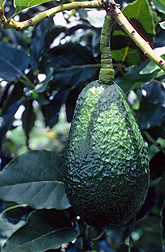This page has been archived and is being provided for reference purposes only. The page is no longer being updated, and therefore, links on the page may be invalid.
Read the magazine story to find out more. |
|
|
New Germplasm Could Help Protect Avocados from Root Rot Disease
By Alfredo FloresAugust 1, 2008
New germplasm to broaden the genetic diversity of avocados is being collected by Agricultural Research Service (ARS) scientists and cooperators to help protect this popular fruit from a fungus that damages avocado tree roots.
To help combat Phytophthora root rot (PRR), researchers at the ARS National Germplasm Repository in the Subtropical Horticultural Research Station in Miami are screening the germplasm for markers for genes that might confer resistance to PRR.
The research is led by plant geneticist Ray Schnell at the ARS Miami lab. Cooperators are molecular biologist James Borrone (now at Oklahoma State University), and colleagues at the University of Florida (UF).
The avocado, a staple in the Mexican diet, is also very popular among U.S. households—so much so that 43 percent buy avocados. The avocado tree, native to the area from Mexico to northern South America, produces a fruit that is unique and nutritious. Avocados contain 60 percent more potassium than bananas, and are also rich in B vitamins and vitamins E and K.
The researchers are searching for ways to make avocado (Persea americana) more resistant to PRR, which causes the roots of P. americana to rot and, if untreated, to die. Excess water predisposes the plants to PRR. This has not been a major problem in south Florida due to the limestone soils and excellent drainage, but one of the major goals of the Everglades restoration project is to raise the water table to restore the water flow in Everglades National Park. This will also increase the water table in the adjacent agricultural lands where avocados are grown, potentially increasing the occurrence of PRR.
Using genetic sequence information, genetic markers (called microsatellites) were developed. Genetic diversity in the collection of 224 accessions has been studied using the genetic markers and, based on this study, researchers plan to add new avocado types from the West Indies.
These molecular genetic markers will be useful for characterizing germplasm, and for developing PRR-tolerant avocado rootstock.
Read more about the research in the August 2008 issue of Agricultural Research magazine.
ARS is a scientific research agency of the U.S. Department of Agriculture.

